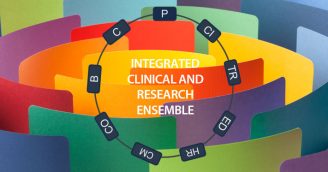
19 Feb CTSI Milestones 2018
At CTSI we recently submitted our Annual Progress Report (APR) to the National Institutes of Health (NIH) and NCATS. While the APR is always an undertaking for our staff, faculty and programs, it provides an opportunity to reflect on our goals and progress to-date, areas of focus over the next 12 months, and challenges we have encountered as we work to transform the clinical and translational research enterprise locally, regionally, and nationally.
In 2017, we transitioned to year three of our second, five-year grant, bringing achievement of several key milestones related to our overall strategic aims, including:
- Strengthening and solidifying the collaborative enterprise required for the translation of new discoveries by leveraging our CTSA’s institutional partnerships, locally and nationally. For example, the collaborative efforts of two Wisconsin NIH funded CTSA partnering entities – our CTSI of Southeast Wisconsin and ICTIR (UW-Madison/Marshfield Clinic – CTSA) resulted in a $5,360,832 NIH All of Us Research grant that will benefit communities across the state of Wisconsin and the country. Marshfield Clinic Research Institute, University of Wisconsin School of Medicine and Public Health, and Medical College of Wisconsin partnered with the BloodCenter of Wisconsin and regional Federally Qualified Health Centers (FQHCs) to engage and recruit research participants for this important national agenda. Our CTSA infrastructure (BMI, CTO, and TRU) are actively engaged in supporting the All of Us grant.
- Hosting and supporting successful processes, facilitating translation of discoveries into health, including our second annual Healthcare Innovation Pitch (HIP) and the 19th Annual HHS SBIR/STTR National Conference. These events created synergy and shed a spotlight on the unique opportunities available in our community to support the development of new technologies, diagnostics, and therapeutic techniques. During the last year, multiple teams form Madison, Milwaukee, and Chicago were mentored in strengthening their intellectual property, satisfying regulatory requirements for drug or device development, writing business plans, presenting to investors, and forming a startup venture. Seed funds were provided to 3 Wisconsin startups. CTSI hosted the 19th Annual HHS SBIR Conference was held in downtown Milwaukee at the Hilton on Nov. 7-9th, 2017. CTSI was the first NIH-funded CTSA institution to receive the hosting bid in the conference’s history. Outcomes of the 19th Annual HHS SBIR/STTR Conference were summarized in a formal Post-Conference Report.
- Piloting innovative strategies such as our Real-Time IRB review, a CTSI envisioned initiative, implemented through a collaboration between CTSI and the Office of Research’s HRPP. This process is designed to reduce the time from IRB submission to approval for full board protocols without compromising ethical or regulatory standards. To date, 18 studies have been reviewed under this process, reducing the average time between initial submission and final approval from 63 days to 27.8 days, a reduction of 56%. In 2018, we will continue to refine and highlight this strategy to reduce IRB turnaround time and accelerate the pace of research at our institution.
- Encouraging and supporting CTSI students and scholars to leverage the array of CTSI services to support and advance their research and careers. For example, Meredith Adams, MD, MS, assistant professor of anesthesiology was awarded a four-year, $737,492 Mentored Clinical Scientist Research Development Award (K08) from the National Institute of Biomedical Imaging and Bioengineering. Dr. Adams leveraged our BMI core, CRDW, and mentoring and support through our CRS program. In addition, Dr. Adams applied and was accepted to participate in the NCATS Innovation Lab on Radical Solutions to the Opioid Misuse Epidemic.
- Expanding CTSI’s 500 Stars Initiative. Our 2017 Summer Internship Program received 192 applications, of whom 133 (69%) were underrepresented minorities (URMs). We enrolled 109 participants, including 83 (76%) URMs (84 high school students and 25 college students). A total of 53 Wisconsin high schools and 19 colleges/universities (local and out of state) participated. At the end of the summer program, students created and presented posters of their research as part of the closing ceremony. Learn more about the program via the recent MCW Magazine story.
- Hosting ten Science Cafés from January to October 2017, on topics based on the recommendation of community members, such as hypertension, diabetes, stroke rehabilitation and the opioid epidemic. More than 268 people attending the Science Cafés in 2017, and results from the evaluations show significant differences on all five health and scientific literacy statements, indicating that attending a Café increases attendees’ perceived confidence in health and scientific literacy, which is consistent with previous evaluation findings. Podcasts of past Science Cafes are also available for streaming.
- Promoting interdisciplinary research, converging disciplines and nucleating scientists and community of stakeholders around topics of interest through our Pilot & Translational Studies program. The program offers support in the form of three Funding Paths designed to address distinct phases of pilot research. The program supported 42 active projects (see pilot progress report; REM). In addition, we received 55 LOIs, with 39 (70.9%) submitting applications, compared to the previous year’s submission rate of 54%. Investigative teams are conducting a broad range of clinical and translational research including: racial/ethnic disparities and PTSD; the effects of older red cell units in adults with sickle cell disease; utility of a fMRI-based biomarker for chronic pain; developing technologies for rapid production of individualized models of congenital cardiovascular diseases to facilitate clinical treatment; and much more.
- Providing biomedical informatics tools and related services to support the interconnected systems and facilitate research, such as the Clinical Research Data Warehouse (CRDW), i2b2, Cohort Discovery, de-identified data extractions, identified data extractions (with an approved IRB protocol), image de-identification, REDCap study development and hosting, the faculty collaboration database (FCD), custom registries and application development. BMI was pivotal in implementing the Best Practice Alerts (BPAs) as well as launching TrinetX, a third-party software firm that bridges providers and pharma to promote clinical trials. These key accomplishments are vital to supporting clinical and translational research within and across our CTSI hub.
- New Faculty Leadership Join the CTSI: Leonard Egede, MD, MS joined the CTSI late 2017, as Co-Director of the KL2 program and component lead for our Research Implementation and Participation module. He is currently spearheading a faculty-led research committee focus on optimizing the Translational Research Units. Dr. Egede is general internist, tenured Professor of Medicine, and Chief of the Division of General Internal Medicine at the Medical College of Wisconsin (MCW). He is also the Director of the MCW Center for Patient Care and Outcomes Research (PCOR), and the Associate Director of Cancer Disparities at the MCW Cancer Center. Dr. Egede is a nationally recognized health disparities research, whose research focuses on developing and testing innovative interventions to reduce and/or eliminate health disparities related to race/ethnicity, socioeconomic status, and geographic location for chronic medical and mental health conditions. Dr. Egede is extremely committed to mentorship, providing mentorship opportunities to students, general internal medicine fellows, interns, post-doctoral fellows, and junior faculty members. As such, he will bring a wealth of knowledge and experience to the CTSI Mentored Career Development Program and early-career investigators interested in the program. He will also oversee CTSI education programs.
In addition to the highlighted milestones and accomplishments above, our CTSI infrastructure supported more than 680 investigators/research staff in 2017. Approximately 77% of these individuals were from the Medical College of Wisconsin, with 21% coming from our valued partner institutions. We look forward to an exciting 2018 as we continue to work on achieving together what we cannot achieve alone!










